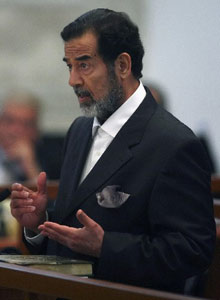
Former Iraqi leader Saddam Hussein addresses the court
during his trial inside the heavily fortified Green Zone in Baghdad yesterday.
Saddam was back in court on Tuesday for the first time since he was sentenced to
hang for crimes against humanity, facing separate charges of genocide of the
Kurds. -Xinhua/Reuters
Former Iraqi leader Saddam Hussein returned to court to face trial on
genocide against Kurds on Tuesday, two days after being sentenced to hang in a
separate trial, and urged Iraqis "to forgive, reconcile and shake hands."
Saddam and two of his senior aides were on Sunday sentenced to death on
crimes against humanity in the trial of Dujail, in which 148 people were
executed in the aftermath crackdown on the town following a failed assassination
attempt against Saddam in 1982.
In Tuesday's trial, Saddam and six former senior aides are facing charges of
genocide for their roles in the 1988 Anfal (Spoils of War) military campaign
against ethnic Kurds. Prosecutors say up to 180,000 Kurds were killed, many of
them by gas.
Chief Judge Muhammed Ureybi begun the session and called the first witness,
Qahhar Khalil Mohammad, 52, who was forced to live in a den with his
seven-member family because the Iraqi army destroyed their village in 1986.
Mohammad and other Kurdish witnesses told the court that they were deceived
by the government promises of amnesty and many of their fellow Kurds only got
shot by the Iraqi soldiers.
He said that he and many people surrendered themselves to the authorities
after a government amnesty, but only to find themselves ended up in a military
camp.
"One Iraqi army officer gathered 37 detainees, including me, and ordered the
soldiers to shoot us," Mohammad said.
"A soldier then shot everyone with a bullet. He hit me on my forehead and my
back," the witness said, showing his scars to the court, adding "I want the
whole world to see my wounds."
The witness continued his testimony, saying that after the soldiers left the
scene, he checked his father and two brothers, but they were dead. Only his
nephew was still alive, so he took the latter's hand and fled the place, he
said.
Mohammad said that he and many others were detained later and were held in a
camp for three years before they were released by another amnesty.
During the session, the first after he was found guilty in the separate case
of Dujail, Saddam appeared unusually calm and he quietly listened to witnesses.
After the first witness' testimony, he complained that the court should
adequately cross-examine the witnesses.
Saddam also challenged the witness. "When he says there are two officers,
what do they look like? Does this bring us to the truth?" Saddam politely
addressed judge Ureybi.
Ureybi approved the demand but said it is for the court to decide which
testimony to take into consideration.
Another witness, Abdul-Karim Nayif Hassan, also told the court that they were
deceived by promises of amnesty, and were dragged to mass killing by the Iraqi
soldiers. He submitted a video showing human remains in a mass grave found near
his village after the Kurds gained self-rule in 1991.
A third witness, Abu Bakr Ali Sa'id, 54, a member of the Kurdish guerrilla
(Peshmerga) gave account of the same incident when Iraqi soldiers killed
detainees near his village.
"The soldiers were ordered to shoot us. We were 33 people, only six survived
and I was one of them but we were also wounded," he said.
The witness said that Saddam was describing the Kurdish people as
"saboteurs", which prompted Saddam to request the Judge Ureybi to verify the
claim.
"All my writings, speeches and government decisions were recorded in the
former Information Ministry. I don't recall that I have said any thing wrong
against any group of my people," Saddam said.
Saddam then called for reconciliation among Iraqis saying, "I call on Iraqis,
Arabs and Kurds, to forgive, reconcile and shake hands," Saddam said.
After hearing a fourth witness, the trial was announced to adjourn till
Wednesday.



